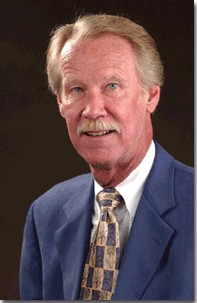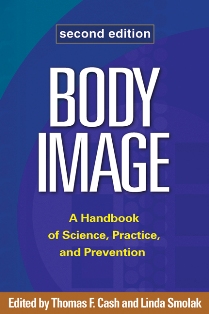When people talk about body image, they're usually talking about how satisfied they are with their looks. Unless you're a research psychologist specializing in body-image issues, you probably don't realize that body satisfaction is only one aspect of the human experience of embodiment that is body image.
In fact, body image has more dimensions than you might imagine. More than a mental picture of what you look like, your body image consists of your personal relationship with your body -- encompassing your perceptions, beliefs, thoughts, feelings, and actions that pertain to your physical appearance. Speaking of dimensions, this multidimensional view of human embodiment is, in large part, due to a singular psychologist -- Thomas Cash.

If you're interested in improving your body image, it's only a matter of time before you're positively influenced by Cash, who spent the last four decades refining our current understanding of the psychology of physical appearance. It was this clinical and research psychologist, after all, who developed today's most effective treatment approach to body image issues, as well as many of the measures used in body-image research.
A psychology professor emeritus at Old Dominion University, this tireless retiree has no interest in resting on his laurels. When he's not editing the journal he founded -- Body Image: An International Journal of Research -- he's publishing books. In the last year, he co-edited the second edition of Body Image: A Handbook of Science, Practice and Prevention, and edited the most comprehensive resource on human physical appearance to date, Encyclopedia of Body Image and Human Appearance. Given that body image is the subject of this unfolding series, I felt compelled to go directly to this go-to guy. What follows are questions and answers from my recent phone interview with Tom Cash.
Q. I'm intrigued -- what inspired you, a man, to dedicate most of your career to a subject that has long been considered a woman's issue?
A. I was trying to come up with a topic for my doctoral dissertation, and my professor suggested I look into the influence of physical attractiveness on initial acquaintanceship. "You mean how good looking a person is?" I remember asking. "I will be the laughing stock of the entire scientific community!" [On his urging,] I ended up doing physical attractiveness research for a decade, and I just became so sick of it. What I [didn't tire of] was seeing if I could come up with a simpler measure of physical attractiveness. Over and over again, I kept finding that [when it comes to self-esteem and other hallmarks of good mental health], self-perception of attractiveness seems to be more important than social perception. So I shifted from the outside view of human appearance to the inside view, meaning away from social judgments of attractiveness in the eyes of others to [one's own judgments].
Q. When you trained a scientific eye on body image, what did you find?
A. I realized there was a need for new measurements. Back in the early 80s, so much of the measurement focused on one to two simple questionnaires that I didn't think were very good, including the Rorschach, [the ink-blot test used by old-school therapists]. I'm not a big fan of the Rorschach. What you'd see, and you still see today, are measures of people's attitudes about their appearance that focus on how do you feel about your hips and thighs. I'm going: "This is not for guys. Men have bodies too."
So much of the research back then was focused on young women, especially adolescents. Eating disorders did us a great service; they created tremendous interest in the importance of the concept [of body image]. But they also took us down a gender-biased road, which ignored men, which ignored older people, which ignored everything except concerns about being fat or being thin. What I've done over the years is try to understand the human condition of embodiment regardless of gender, age, etc., and try to develop measures that focus on more than "Do I look fat in this dress?"

Q. Did you ever struggle with body image issues yourself?
A. As a 99-pound weakling and a four-eyes -- I wore glasses -- I knew that the body I had as an adolescent didn't fit with other people's idea of what a guy was supposed to look like. There's always been a lot of pressure as a male to be muscular. I was lifting weights and doing pushups, but I couldn't gain weight or develop much musculature. I played football and pretty much got my face kicked in by those great big country boys who are shaving at the age of 11. My body never changed much. I'm still a tall, slender guy. That's me. That's OK.
Q. With each passing decade, America's body image seems to be getting worse, not better. Do you think it's actually worse than four decades ago or is there simply a greater awareness?
A. I don't believe it's continuing to get worse, but what some people do to show that it's gotten worse is take the surveys from the 70s, 80s and 90s, and show higher percentages of body dissatisfaction. The problem is you're comparing apples and aardvarks. The three surveys were done with different questions and different response scales. You simply can't do that. The few cross-sectional studies that use the same exact measure showed body image getting worse for women and staying the same for men through the 80s and early 90s. Around the mid-90s, women showed an improvement, but men stayed the same with much lower rates of dissatisfaction. So things seem to be getting a little better, but the rates are still fairly high. What's interesting is during the time that body image was improving, weights were going up.
Q. You mean Americans gained weight and body satisfaction simultaneously? Why do you think that is?
A. One could only speculate. College campuses have done a lot more with eating disorder prevention and body-image awareness. There's so much more on the internet that says you can love your body; you don't have to be a model. Another part of it is the media [campaigns] that help people see through the deceit and misrepresentations in the media about what a body should look like.
Q. It was you and your colleagues who coined the term "phantom fat." Is that like phantom limb syndrome?
A. Yes, "phantom fat" is a phenomenon where people lose weight and yet they still "see themselves as fat." It's not ubiquitous. There are some individuals who lose weight and are able to see themselves differently. But [there are many] who are used to seeing themselves one way, and when that changes, there's this disconnect. Believe me, I know. I had a beard for 40 years and shaved it off. It took me a long time before I stopped thinking: "What did I do? I've got a lip." There's some evidence to suggest that when individuals lose weight, they don't fully lose that body-image vulnerability. Their body hasn't been a very good friend. They don't trust it. Lots of folks who lose weight have lost and regained, lost, regained, so their body reminds them of that vulnerability.
Q. How do you suggest Americans change bad body image for good?
A. The short answer is my eight-step program. Back in the 80s, I developed a traditional cognitive-behavioral therapy approach, did a controlled study, and basically said, "Wow, this works!" Individuals need to learn strategies for self-acceptance, and to put their looks in perspective. Individuals [with body-image issues] are reactive to [appearance-related] thoughts or conditioned emotions, and they tend to react in one or two ways: avoidance [avoiding things like looking in the mirror, bathing-suit shopping] and appearance-fixing [fixing your appearance by losing weight, wearing Spanx, among other things]. Both are problematic because they maintain the notion that something is wrong with the way you look. If individuals learn to accept that "I don't like this part of me very much," they'll ultimately be able to say, "I don't have to have to like this part in order to be happy. I just need to work on being a happy me." Frankly it takes work. In fact one of the biggest objections to my Body Image Workbook is that I don't really tell readers that it's a lot of work. I actually do tell them. It is a workbook!
Q. What's the connection between achieving a positive body image and a healthy, sustainable weight?
A. The two go hand in hand. The whole idea is if you lose the weight, you're going to love the way you look, well, "phantom fat" says that's not the case. It's important to get someone who is heavy and needs to lose weight for health reasons to begin to think differently about how they look. Otherwise, what you get is: "I gotta lose this weight. If I don't lose this weight, I'm a fat slob, and no one will like me." That's a hell of a lot of pressure. Generally, people don't lose weight if they're under a lot of stress.
Incorporating body-image [work] toward the end of weight loss or during weight maintenance is important. If you put it in too early on in the game, people often say: "I just want to lose weight. I hate my body. Don't tell me I shouldn't hate my body." It just doesn't make sense to them. Over time, it's better received because weight loss can be a catalyst for them to think and act differently.
Some heavier individuals have divorced themselves from their body -- they don't want to look at their body or think about their body. It's the enemy. Whether or not your body loses weight, it's still your body. You need to get in touch with it. You need to find ways to enjoy your body as you're losing weight. Don't let the number on the scale define your self-worth. That number is arbitrary. Your body is with you forever.
So concludes the fourth installment of this body image series. Next up, Biggest Loser
Ashley Johnston discusses her ongoing body-image struggles. If you want to be sure to catch each and every installment, click the fan button at the top of this page. If you're one of those rare women who loves her body, do leave a comment and/or contact me through my website. This blogger is in search of future profile subjects as well as effective body image programs.
Jean Fain is a Harvard Medical School-affiliated psychotherapist specializing in eating issues, and the author of "The Self-Compassion Diet." For more information, see www.jeanfain.com. Got comments on any of the above? Share your two cents in the Comments section.
For more by Jean Fain, L.I.C.S.W., M.S.W., click here.
For more on emotional wellness, click here.